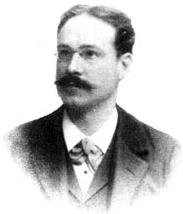Hinke Bergegren


Henrik "Hinke" Bergegren (1861–May 10, 1936) was a Swedish Social Democratic politician.
Bergegren was an early member of the newly founded Swedish Social Democratic Party and he represented a revolutionary tendency, best described as Anarcho-syndicalism (but did not later join the SAC, co-founded by followers of Hinke, and continued to criticize the union from an anarchist standpoint). He was an important figure in the publishing of the Brand, one of the oldest still published anarchist magazines in the world. Because of his anarchistic standpoints, Bergegren was later expelled from the Social Democratic Party by its leader Hjalmar Branting.
Hinke Bergegren is mostly known for being an early agitator of free love. In 1910 he held the speech Kärlek utan barn (Love without Children) in which he advocated for the legalization of birth control in Sweden. For this he was taken to court and received a short prison sentence under a newly adopted law known as Lex Hinke (named after Bergegren), which made it illegal to advocate birth control.
In 1921, Hinke Bergegren joined the Swedish Communist Party, and the same year, Bergegren went to Moscow for the third congress of the Communist International to represent Sweden together with Zeth Höglund and Fredrik Ström.
